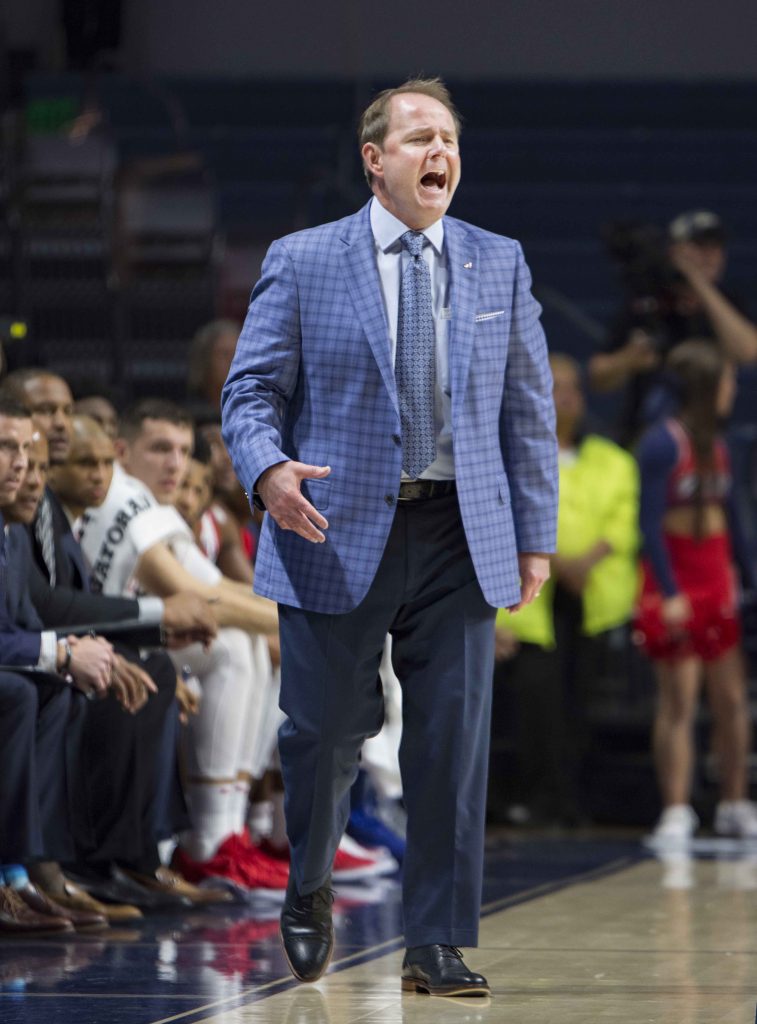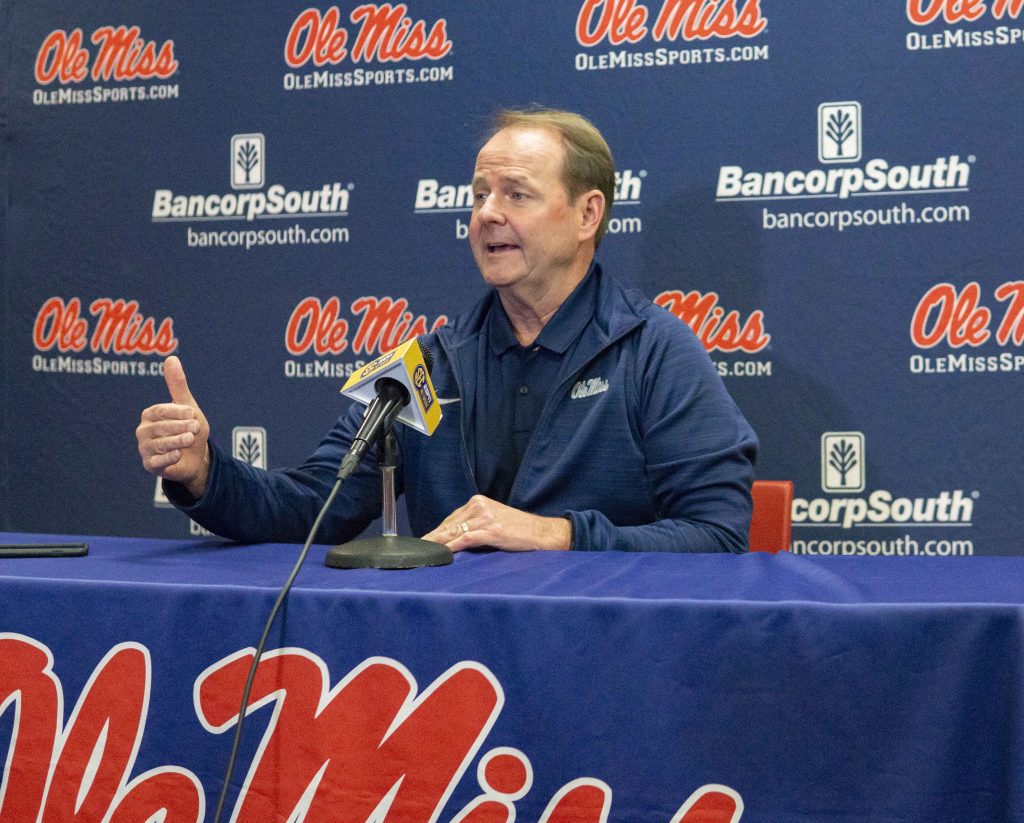Cinderella story Middle Tennessee State University had just defeated final-four favorite Michigan State in the 2015 NCAA Tournament and was preparing for the most important game in program history against Syracuse when senior guard Perrin Buford walked into team film study one minute late.
Head coach Kermit Davis looked at his team leader and said, “You’re not starting.” Then he pointed at one of Buford’s back-ups and told him that he was.
Some might consider the decision to sit a starter in a crucial NCAA Tournament game for a seemingly inconsequential blunder to be short-sighted — but not Davis, the new frontman of Ole Miss Basketball.

Men’s basketball Coach Kermit Davis watches the team from the sidelines during the team’s exhibition game against against Fayetteville State earlier this season. Ole Miss won the game 101-52. File photo by Christian Johnson
“We’re gonna treat everybody the same,” Davis said. “There are standards for our walk-ons, for our staff, for our players. Everyone’s gotta be a part of this process and do their job. It’s just who we are.”
Accountability is a hallmark for Davis. Once one of the brightest young stars in his profession, Davis fell from grace in 1990 after recruiting violations vanquished his tenure at Texas A&M. In the three decades since, Davis has spent his life rectifying his image and building on the success he had as a burgeoning coach.
“Every stop that I have made has made me who I am today,” Davis said. “We’re gonna learn from our struggles — they often determine our success. It made who I am, and it’s made me a better coach.”
Before Davis was enshrined as Ole Miss basketball’s 19th head coach, before he won 25 games five times in seven seasons at Middle Tennessee State, before he was the youngest head coach in college basketball, he was an assistant at the University of Idaho. Tim Floyd gave him his first job in 1986.
Floyd, a Mississippi native himself, wanted an assistant that he could trust.
“We needed to bring somebody in that we we’re comfortable with that can really coach,” said Floyd. “I didn’t want guys who were salesmen — I wanted guys who could really do it.”
So Floyd made the call to Davis.
Davis grew up with a basketball surgically fastened to his hands. His father, Kermit Davis Sr., was a decorated basketball coach at Mississippi State University, where Kermit Davis Jr. would suit up to play and eventually serve as a graduate assistant.
“Kermit was destined to be great,” Floyd said. “He had a better offensive mind than any of the coaches that had worked with me through the years.”
Floyd noted that, even when Davis was a young assistant, his knowledge of both sides of the ball was exceptional. “The fact that he understood offense was a real rarity,” Floyd said. He added that, even in his time coaching in the NBA, he found himself utilizing Davis’ offensive principles, his zone offensive schemes and inbounds plays.
In 1988, Floyd left Idaho for New Orleans University, leaving a vacancy that Davis would fill. At the time of his hiring, he was the youngest Division 1 head coach at 28 years old. Davis turned a 19-11 Idaho team that didn’t make the postseason into a group that went 25-6 in back-to-back years and achieved consecutive NCAA Tournament berths. At just 30 years old, Davis was one of the most sought-after coaches in America.
In 1990, he left Moscow, Idaho, for College Station, Texas, where he’d serve one tumultuous season as head coach of the Texas A&M Aggies. Davis went 8-21 in that year, but his abysmal record was the least of his worries.
Following an NCAA investigation into program misconduct, Davis and A&M were found culpable in their use of a street agent to convince a player to transfer to their university. A&M was slapped with a two-year probation and in less than 12 months, Davis was out the door. Davis donned college basketball’s scarlet letter.
He found temporary residence at Chipola State Junior College, Utah State, Idaho once again, and LSU, but landed safely in 2002 at Middle Tennessee State University where he’d coach for 15 years. In Murfreesboro, Davis resurrected himself; he once again became one of the most successful and respected head coaches in the nation.
Greg Grensing, an assistant under Davis for seven years at MTSU, believes that Davis is one of a kind.
“There are 351 Division 1 schools, and they’d all like to be successful,” Grensing said. “But not many of them have a coach who is going to demand that level of accountability on a daily basis, that’s going to raise the bar like he does.”
And it isn’t just rhetoric. The decision to sit Buford in arguably the most monumental game in program history is evidence of this.
“The bottom line was, he had to coach those other guys next year. That act resonated throughout the locker room,” Grensing said. “He felt like that’s what he had to do, and he wanted to send a message.”
From 2011 until he left in 2018, Davis attained a .638 winning percentage at MTSU, good for No. 13 in the country. He won 25 or more games in five seasons and reached the NCAA Tournament twice. In 2015, as a 15-seed, MTSU upset No. 2 Michigan State — a team predicted to be a Final Four favorite.
The victory lives on in college basketball lore, but it wasn’t a fluke. After the game, MSU head coach Tom Izzo said, “We got beat by a better team today. They were well coached, they ran good stuff. They just beat us.”
Davis is considered one of the best tacticians in the sport. The 1-3-1 defense, a trademark of Davis’ coaching philosophy, is a microcosm of how he runs his program. For each offensive move, Davis has a designated defensive counter. Everything about his schemes is methodical; his players know their roles and don’t break from them.

Men’s basketball Head Coach Kermit Davis speaks at a press conference earlier this week. Photo by Justin Joyner
“(Kermit’s system) taught you how to play the game the right way,” Shawn Jones said. “Everybody knows what was expected from them at their positions and spots on the floor. Playing that way really enhanced my basketball IQ.”
Jones played under Davis at MTSU from 2010-2014, where he was named Conference USA Player of the Year in 2014. He’s playing professionally in Israel but still stays in communication with Davis when he’s stateside. Jones elected to play at MTSU because of who Davis is as a person.
“Coach Davis is big family guy,” Jones said. “That was a big thing for me because I was leaving my own family to go play somewhere, and the feeling of a family with the team really made me comfortable.”
Davis has only been in Oxford since March, but in the few months that he’s worn the red and blue he’s made his presence felt.
He’s visited with various organizations on campus, eaten lunch at sorority and fraternity houses, and overseen the return of the Square Jam dunk contest this October. It’s all part of an effort to shepherd Ole Miss basketball back into relevance at a time when apathy surrounding the athletic department is rampant.
While positive public relations are necessary in building a brand, the only way to create excitement is by winning basketball games. In his first five games as head coach, Ole Miss is 3-2, including a promising victory over Baylor on national television.
Davis enters Oxford at a time when the SEC is perhaps the strongest it’s ever been. Predicted at SEC Media Days to finish last in the conference, this program will take time to resurrect. But Davis understands this.
“If anybody knows the degree of difficulty of what he’s undertaking, it’s him,” said former assistant Greg Grensing. “He doesn’t have rose-colored glasses on. He knows it’s going to take a whole lot of work.”






